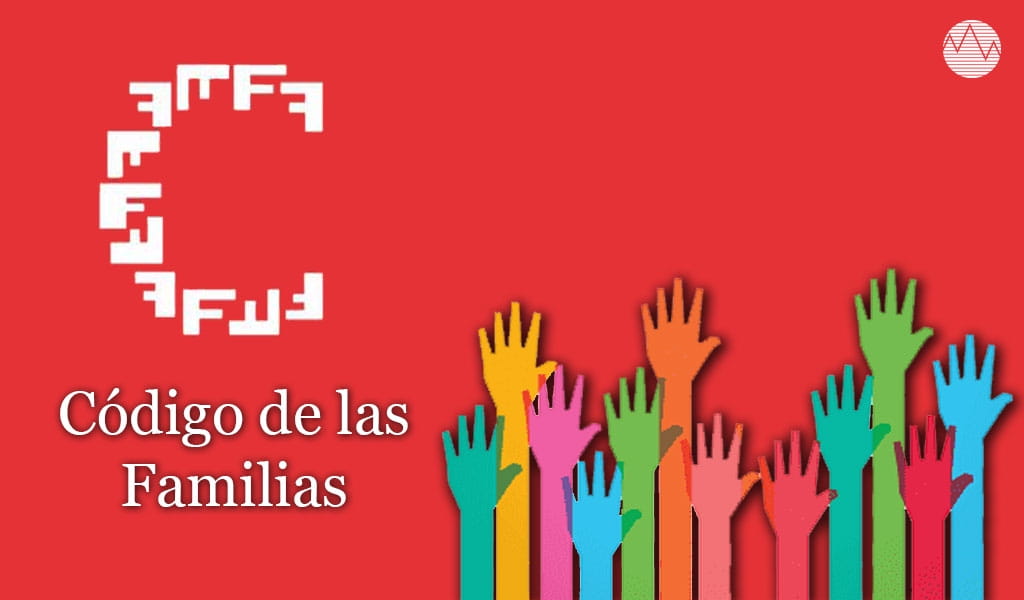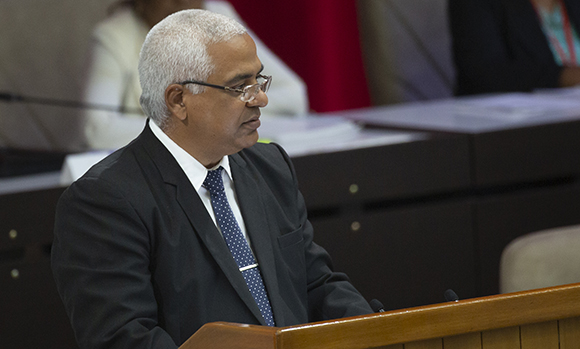
Approved new Family Code: Popular referendum will be held on September 25
As part of the legislative schedule derived from the Constitution, the National Assembly of People's Power of Cuba approved this Friday the new Family Code, which will be submitted to a popular referendum on Sunday, September 25, between 7:00 a.m. and 6:00 p.m.
The legislators gave the green light to version 25 of the project, after "a necessary, intense and enriching consultation process (...) in a genuine exercise of participation", which included the contribution of legislators, experts, academics and the population in general, highlighted the Minister of Justice, Oscar Silvera Martínez, when intervening in the ninth regular session of Parliament in its ninth legislature.
The current text is a more solid proposal, impregnated with popular wisdom, with a high human content, "a project for all and for the benefit of all" that "does not regulate rigid or pre-established family models," the minister stressed when putting it to a vote the new regulations.
This law "addresses the characteristics and situations of each person" and offers a solution to modern problems as an expression of respect for the mandates of the Constitution, said Silvera Martínez.
In the popular consultation, whose results were known on May 15, 6,481,207 Cubans participated (75.93%), 61.96% of whom expressed themselves in favor of the text.
Total meetings: 79,192
• Abroad: 1,159
• 336,595 interventions
• Proposals processed: 434,860
• Work groups and students: 73,211
As a result of this process, 47.93% of the general text and 49.15% of the total articles were modified.
Among the changes applied to the project, care is expressly recognized as a right and the protection of children and adolescents in exceptional and disaster situations is extended.
Likewise, urgent protection against discrimination and violence is reinforced, and the possibility of filing a complaint is extended to anyone who knows about these facts.
The new version improves the understanding of the sources of filiation and the types they generate, as well as the assumptions in which multiparenthood derives.
Norms of the exercise of parental responsibility are also outlined that link the consent of both holders of parental responsibility, for example, for departures from the national territory and its repercussion in the event of the abduction or retention of children and adolescents.
A percentage of the changes are improvements in the wording, greater rigor in the systematics, reformulation of statements, breakdown into subsections and changes of letters, among others, to achieve greater understanding and comprehension of the text.
Titles with major modifications:
• IV “On Filiation”
• V “Of Parental Relations”
• VI “On Marriage”
• VIII “Other institutions for custody and protection in the family sphere”
Other legal institutions are maintained and perfected:
• Marriage
• De facto affective unions.
• Adoption.
• Assisted human reproduction techniques.
• Progressive autonomy.
• Parental responsibility.
• Positive notion of parenting without violence.
The Family Code -said the Minister of Justice- reaffirms the humanistic character of the Cuban Revolution, stands as guarantor of the constitutional postulations referring to personal and family rights, and guides our State and Cuban society in the search of a more just nation.

In general, the Family Code:
• Seeks to recognize and protect vulnerable sectors of society.
• There is an intentional treatment against discrimination and violence in the family space.
• Recognizes the rights of older adults.
• Incorporates the possibility of solidary gestation.
• Transformation from a system of authority to one of responsibility in the relationship between mothers and fathers with their children.
• Develops the right of all people to found a family and marry.
• Family caregivers are named and recognized.
A style commission will review the text before it is submitted to a referendum.
In a message sent to Parliament, Esteban Lazo Hernádez expressed his support for the Family Code, which he said, "we are sure of the support of our people in the referendum."
"I am in good health, complying with the medical protocol and I wish to join the work soon," he said.
Family Code: The deputies take the floor
Before voting for the text, the deputies took the floor.
Deputy Danhiz Díaz considered that the new code highlights the values of marriage and family affections. “I found in that text the family I want to build, and I don't have to deny the right to build the family model that another person wants”.
Danysell Cañizares also supported the Code, for its inclusive nature and for recognizing the family as the central nucleus of Cuban society.
"We are in the presence of an act of love," said Lissette Martínez, deputy for Habana del Este. "Approving this law is, without a doubt, a moment that will make us grow as a nation."
Martínez referred in her intervention that the Cuban children of today deserve to have their guarantees endorsed in the Code for the future.
“Parents can exercise effective parenting, learn to raise our children to be good men and women. This is a revolutionary and genuine code. It is a Martian code in that feeling of love, morality and dignity that the Apostle has instilled in each one of us,” she said.
For his part, the deputy Miguel Barnet, before beginning his intervention, affirmed that his words were dedicated to "all those who suffered discrimination for years and are not with us."
The honorary president of Uneac claimed to be a defender of this legal regulation. “Cuban society deserved a project that represented it in all its complexity. This is a code for the new generations. With him we will defend a project for a more coherent, humane and revolutionary country. The Paleolithic era has passed. This Family Code will place us at the forefront of modern thought”, he stressed.
Barnet insisted on the need to change everything that needs to be changed in search of a society “with everyone and for the good of all”.
“There is no need to be afraid of a new future of solidarity and inclusiveness. Fear is not good (...) We will give the world an example that will fill us with pride. The postulation of affective union is our golden rule in this new battle of ideas. Under no circumstances are we going to leave the future orphan. I put my heart on the pages of this Cuban Family Code”, concluded the Cuban writer and ethnologist.
For the legislator José Castañeda Martínez, the new legal instrument provides greater attention to the elderly and people with disabilities.
In Mariela Castro's opinion, this is an exciting moment for a people committed to more advanced ideas of the Revolution. The director of the National Center for Sex Education (Cenesex) described the document as admirable, for being the result of "an impeccable process of popular participation, of democratic exercise."
He thanked the people for their participation, which has strengthened their culture in this consultation process. "There were those who did not believe that this code was going to be possible," he said, recalling that this step has been carefully arrived at, in permanent dialogue.
He highlighted the historic generation of the Revolution, "which gave the possibility of advancing in all the elements that we are placing in our collective life, overcoming prejudices."
“No one can be blamed, because all the processes of conquest of rights are complex,” he added.
Mariela Castro thanked Fidel, Raúl and Vilma for the love they instilled in her, for the commitment to the Revolution and the history of Cuba, the ability to listen, dialogue and put into practice in family life many of the principles that today the endorses the Family Code.
The deputy for Holguín María Armenia Yi Reina, a religious leader, pointed out that the new code constitutes a leap in the construction of an inclusive and fairer society. "Although it raises issues that I do not share, based on my Christian principles and my faith, I say yes for the project and I urge that it be taken to the popular consultation and that it participate in exercising constitutional right."
Teresa Amarelle, general secretary of the Federation of Cuban Women (FMC), said that the new code is the materialization of the struggles of Vilma Espín and women for decades.
Do you agree with the Family Code? Question of the referendum.
Regarding the popular referendum, defined in the eleventh transitory provision of the Magna Carta, Homero Acosta Álvarez, secretary of the ANPP, reported that it will be held on Sunday, September 25, between 7:00 a.m. and 6:00 p.m.
The vote abroad will take place a week before, with the definitions that will be established later by the National Electoral Council, the jurist specified.
He explained that the question for voters to consider is the following: Do you agree with the Family Code?
"We consider that it is a clear, simple question that facilitates the voter's response in one way or another, and helps to easily identify the object on which the referendum falls, in this case, the Family Code," He said.
The Code will be considered finally approved if it receives more than 50% of the valid votes deposited in the polls.
The National Electoral Council, in compliance with its constitutional and legal mandate, will be in charge of the organization, direction and supervision of this process, in accordance with the Electoral Law.
The Family Code is a work that requires its validation by popular vote. "A participatory conjunction between representatives and the people, in which the latter becomes a true actor and protagonist of the legislative act."
Homero Acosta commented that, until now, Cuba was only aware of consultation and referendum processes in the constitutional sphere. This is how the constitutions of 1976 and 2019 were approved.
Neither the current constitution nor any other normative provision establishes the rules for carrying out the legislative referendum, which, moreover, does not have to be exactly similar to the constitutional one.
The Electoral Law of July 13, 2019 defines the National Assembly as the only body empowered to call a legislative referendum and in its article 256 states that in this "citizens with electoral rights, through free, equal, direct and secret voting , express whether they ratify, approve, modify or repeal a certain legal provision”.
The aforementioned law also grants the supreme body of state power the power to define the rules for this type of referendum.
Citizens may cast a single vote, direct and secret.
They will have the right to vote, as established by the Constitution in electoral processes, all citizens over 16 years of age on the day of the referendum, with the exception of those prevented by the circumstances provided for in the Constitution and the law.
“The final decision will remain in the hands of the sovereign. We are convinced that at the time, the majority of the Cuban people will make this revolutionary, inclusive and democratic code their own,” said Homero Acosta.
